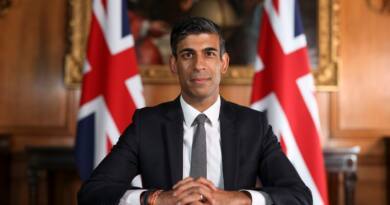A New Era: South Asian-Origin Leaders Shaping Politics In British Isles
The rise of leaders of South Asian Origin in the United Kingdom, Scotland, and Ireland is a testament to the changing face of politics in these regions. In a time when the world is grappling with issues of diversity and representation, these countries are taking the lead in breaking barriers and paving the way for a more inclusive future.
The UK, in particular, has seen a significant rise in the number of politicians of South Asian Origin in recent years. In 2021, Rishi Sunak, the son of Indian origin parents, became the first British Indian Chancellor of the Exchequer. Priti Patel, the daughter of Ugandan-Indian immigrants, holds the position of Home Secretary. In Scotland, Anas Sarwar, a Scottish Pakistani, became the leader of the Scottish Labour Party in 2021. In Ireland, Leo Varadkar, the son of an Indian immigrant, served as the Taoiseach, or Prime Minister, from 2017 to 2020.
The emergence of these leaders is a reflection of the changing demographics of these countries. South Asian Origin immigrants have been settling in the UK, Scotland, and Ireland for several decades, and their children are now coming of age and entering the political arena. They are bringing with them their unique perspectives and experiences, and challenging the traditional power structures that have been in place for centuries.
One of the reasons why South Asian Origin leaders are gaining prominence in these countries is their ability to connect with diverse communities. They understand the challenges faced by ethnic minorities, and are able to articulate their concerns and aspirations in a way that resonates with people from all backgrounds. They are also able to bridge the gap between different cultures and religions, and promote greater understanding and harmony in society.
Another factor that has contributed to the rise of South Asian Origin leaders is their commitment to social justice and equality. Many of them have a background in community activism and have championed causes such as anti-racism, gender equality, and workers’ rights. They bring a fresh perspective to these issues, and are able to offer innovative solutions that reflect the needs and aspirations of the people they represent.
Despite their success, South Asian Origin leaders still face challenges and obstacles in their political careers. They are often subjected to racial and religious discrimination, and have to work twice as hard to prove their worth and credibility. They also face pressure from their communities to represent their interests, which can sometimes conflict with their responsibilities as elected officials.
However, these leaders have shown resilience and determination in the face of adversity. They have broken down barriers and shattered stereotypes, and have set an example for future generations to follow. Their rise to power is a symbol of hope and progress, and a reminder that diversity and inclusion are the key to building a better and more equitable world.
Historically, the United Kingdom, Scotland, and Ireland have been predominantly led by white leaders. However, in a stunning turn of events, these nations are now being led by politicians of South Asian Origin. Rishi Sunak, Leo Varadkar, and Humza Yousaf are the three prominent leaders who have been making headlines for their extraordinary political careers. This shift in leadership has been dubbed the “Empire Strikes Back” by many political analysts and commentators.
Rishi Sunak, a British-South Asian politician, became the Prime Minister of the United Kingdom in less than six months’ time. Sunak was born in Southampton to immigrant parents from Kenya and India, and he is the first person of color to hold this position. Sunak has been widely praised for his handling of the economic fallout from the COVID-19 pandemic and his efforts to boost the UK economy.
Leo Varadkar, the son of an Indian immigrant, served as the Taoiseach (Prime Minister) of Ireland from 2017 to 2020. Varadkar is credited with playing a key role in securing a Brexit deal between the UK and the European Union.
In Scotland, Humza Yousaf is another prominent politician of South Asian Origin who is making his mark on the political landscape. He was recently elected by the Scottish National Party to replace Nicola Sturgeon as the First Minister of Scotland, which is equivalent to the Prime Minister position. Yousaf, who was born in Glasgow to Pakistani immigrant parents, is a member of the Scottish National Party (SNP) and currently serves as the Cabinet Secretary for Health and Social Care in the Scottish Government.
The opposition leader in Ireland, Anas Sarwar, was elected as the leader of the Scottish Labour Party in February 2021. Sarwar, who is of Pakistani descent, is the first person from an ethnic minority background to lead a major political party in Scotland. He has made it his mission to address issues of social justice and inequality in Scotland, particularly in relation to the COVID-19 pandemic.
The rise of these South Asian Origin leaders in the UK, Scotland, and Ireland represents a significant shift in the political landscape of these nations. It also reflects the growing diversity of these countries and the increasing influence of minority communities in their political systems.
While these leaders have achieved remarkable success, their journey has not been without challenges. Some critics argue that they do not fully represent the interests of their communities or do enough to address issues such as racism and discrimination. Others have accused them of being “tokens” who have been promoted simply because of their ethnicity.
However, the emergence of these South Asian Origin leaders is a clear indication that the political power structures of these nations are changing. As these leaders continue to make their mark on the political stage, they are likely to inspire others from minority backgrounds to pursue careers in politics and challenge the status quo. The Empire may be striking, but it is doing so in a more diverse and inclusive way than ever before.
There have been UK politicians of Bangladeshi descent, such as Rushanara Ali. She was the first person of Bangladeshi descent to be elected to the UK Parliament and has held various positions, including Shadow Minister for International Development and Shadow Minister for Education. The British Bangladeshi community eagerly awaits a star politician to break the glass ceiling and reach the top.
The rise of these South Asian Origin leaders is not unique to the UK, Scotland, and Ireland. In recent years, there has been a noticeable increase in the number of politicians of South Asian Origin descent around the world. In the United States, Kamala Harris made history when she became the first woman, first black woman, and first South Asian Origin woman to serve as Vice President.
Similarly, in Canada, Jagmeet Singh, the leader of the New Democratic Party, is of South Asian descent. Singh is the first person of colour to lead a major political party in Canada and has been praised for his advocacy on issues such as affordable housing, climate change, and racial justice.
The emergence of these South Asian Origin leaders is significant not only because it signals a shift in political power structures but also because it offers a new perspective on how politics can be done. As individuals who have experienced the challenges and triumphs of being part of a minority community, they bring a unique perspective to the table.
Their presence in leadership positions also serves as an inspiration to others who come from similar backgrounds. Seeing someone who looks like them in positions of power can be a powerful motivator for young people who may not have considered a career in politics before.
While there is still much work to be done to address issues such as systemic racism and discrimination, the emergence of South Asian Origin leaders in politics is a positive step forward. It represents a shift towards more inclusive and diverse political systems and provides hope that the political power structures of the future will be more representative of the communities they serve.
The Empire may be striking back, but it is doing so in a more diverse and inclusive way than ever before. These leaders offer a new perspective on how politics can be done and serve as an inspiration to others who come from similar backgrounds. It is a testament to the power of diversity and the potential of individuals to break down barriers and make a positive impact on society. As the world becomes increasingly diverse, the political systems that govern it must also become more representative of the communities they serve. The emergence of South Asian Origin leaders is a step in the right direction.
As these leaders continue to pave the way for a more inclusive and just future, we must all come together to support and amplify their voices, and work towards a world where everyone has an equal opportunity to succeed.





